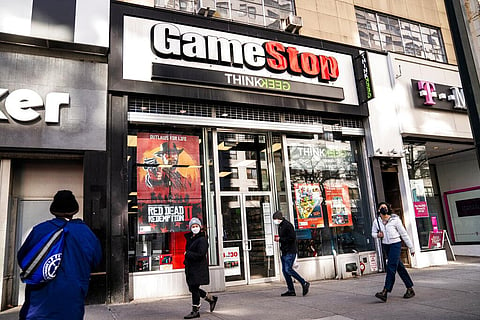

WASHINGTON: Lawmakers in Washington are digging into the GameStop saga at a congressional hearing.
The episode has been portrayed as a victory of the little guy over Wall Street titans, but not everyone is buying it.
Lawmakers from both parties are among the skeptics.
GameStop shares soared 1,600 per cent in January before falling back to Earth.
Entangled in the drama are huge short-selling hedge funds, a social media message board and ordinary investors wanting in on the hottest new trade.
The House Financial Services Committee holds a hearing Thursday.
The head of the panel, Rep. Maxine Waters, D-Calif., is homing in on hedge funds, which she says have a history of "predatory short-selling."
"We must deal with the hedge funds whose unethical conduct directly led to the recent market volatility," Waters said in a statement.
With short-selling, investors bet a stock's price will drop.
Defenders of the practice say it's a tool for uncovering a stock's true value and due-diligence investigating of companies.
The players in the hearing include a swaggering 34-year-old YouTube personality and GameStop evangelist; one of the richest and most prominent investment tycoons; and the CEO of the online platform Robinhood that hosted a tsunami of speculative GameStop trading but faced intense criticism for restricting trading at the height of the frenzy.
The CEO, Vlad Tenev, is denying speculation from some lawmakers that Robinhood acted to favor its big Wall Street clients when it blocked customers on January 28 from buying shares of GameStop and a dozen other companies.
The restrictions lasted in some form for days.
The accusation is that Robinhood changed the rules of the road midway through to favor big clients that stood to lose money if GameStop shares kept rising.
"Any allegation that Robinhood acted to help hedge funds or other special interests to the detriment of our customers is absolutely false and market-distorting rhetoric," Tenev says in written testimony prepared for the hearing.
"Our customers are our top priority."
Tenev says Robinhood imposed the trading restrictions solely to meet capital requirements set by regulators.
As they question Tenev and other witnesses, lawmakers will look for what the GameStop trading frenzy says about the fault lines and potential conflicts in the structure of the market that can hurt unsophisticated investors.
"We don't know whether it will just be warnings versus actual findings in terms of (stock) manipulation. That's going to take time," Quincy Krosby, chief market strategist at Prudential Financial, said in an interview Wednesday.
"It's clear the concern is there. We'll see how the (Biden) administration handles this."
The online GameStop booster, Keith Gill, who goes by Roaring Kitty, plans to tell the lawmakers that he reaped a profit on his investment because he did his homework, and not because he touted the stock to "unwitting investors," according to his prepared remarks.
"I did not solicit anyone to buy or sell the stock for my own profit," Gill says.
"I had no information about GameStop except what was public."
Expected to testify remotely at Thursday's hearing are: "Tenev, an early-thirties entrepreneur who started Robinhood in 2013 with a fellow Stanford University math student."
Claiming 13 million users, the mobile app's popularity has grown, fueled by a simplified trading format and first-stock-for-free inducement appealing to millennials.
The Silicon Valley company is said to be looking to go public this year; the GameStop debacle has brought unwanted attention.
With its mission "to democratize finance for all," Robinhood offers commission-free trading.
Critics say its users pay in another, more hidden way, because Robinhood provides the data on stocks they're buying and selling to big Wall Street firms.
And the firms pay companies like Robinhood to send their customers' orders to them for execution.
Tenev is certain to be asked whether Robinhood's abrupt freeze on individual users buying GameStop shares was done at the behest of Wall Street titan Citadel -- its biggest trading partner -- or other major firms.
Citadel says it "has not instructed or otherwise caused any brokerage firm to stop, suspend or limit trading or otherwise refuse to do business."
"Ken Griffin, Citadel CEO. One of the wealthiest hedge fund managers in an industry full of multi-billionaires.
Hedge funds, which cater to the uber-rich, command trillions in assets and are known by their penchant for risk and prolific use of short-selling.
Griffin is politically plugged in and has been a heavy donor to Republican politicians.
Chicago-based Citadel is one of the biggest hedge funds, and its separate securities-dealing business handles an estimated 25% of all U.S. stock trading.
Citadel stepped in with a few other funds to rescue Melvin Capital Management after it sustained billions in losses on its GameStop bets.
Gabriel Plotkin, Melvin Capital's founder and chief investment officer, will also appear at the hearing.
"Gill, AKA Roaring Kitty."
The most visible protagonist and GameStop booster on the WallStreetBets subreddit with his R-rated energy, bright red headband and colorful T-shirts.
The 34-year-old operating out of the basement of his home in a Boston suburb drew legions of investors into his orbit as they joined his livestream chats on YouTube.